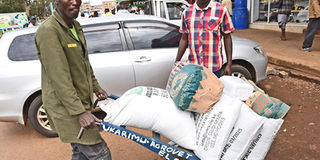Save agriculture sector from higher taxes, lobbies’ plea to Uhuru

Philip Yegon (right) buys inputs including maize seeds and fertiliser in readiness for planting in Uasin Gishu County. Fertiliser Association of Kenya chairman, Eustace Muriuki, said that fertiliser, being a critical farm input has never been subjected to VAT. PHOTO | JARED NYATAYA | NATION MEDIA GROUP
What you need to know:
- MPs, however, gave the sector a ray of hope by rejecting the proposals before passing the bill, which is currently awaiting presidential assent.
- Low food prices boost accessibility, availability and stability of households as well as play a significant role in ensuring that the economy grows.
- The Covid-19 pandemic has totally grounded operations, leading to destruction of flowers worth billions of shillings and workers sent home.
- Eustace Muriuki, fertiliser association chairman, on the other hand, said that fertilisers as a critical farm input have never been subjected to VAT.
Stakeholders in the agriculture sector are hopeful that President Uhuru Kenyatta would sign into law the Tax Laws (Amendment) Bill, 2020, as passed by Parliament on Wednesday to boost the sector that is bearing the brunt of the coronavirus pandemic, locust invasion and floods.
MPs rejected Treasury’s proposals to introduce taxes on fertiliser, inputs for making pesticides and raw materials locally purchased or imported by agricultural machinery manufacturers, among others.
The Kenya Flower Council (KFC), Agriculture Sector Network (ASNET) and Fertiliser Association of Kenya had protested the proposals in the bill noting that they were ill-timed and ill-informed.
MPs, however, gave the sector a ray of hope by rejecting the proposals before passing the bill, which is currently awaiting presidential assent.
ASNET chairman Bimal Kantaria said the bill passed by Parliament assures the country of food security since farmers would be able to access the inputs.
“We appeal to the President to sign the bill and save the sector from more taxes,” he said.
Council of Governors agriculture committee chairman Muthomi Njuki said Parliament’s rejection of the National Treasury’s proposals to remove VAT exemptions on food and agricultural items come as a relief to farmers and ordinary citizens.
“MPs’ move will play a key role in protecting our economy from the negative impacts of the pandemic by ensuring money flows from smallholder farmers to the SMEs that support them, and the large-scale agro-processors and dealers thus providing some level of security for the economy,” he said.
He added low food prices boost accessibility, availability and stability of households as well as play a significant role in ensuring that the economy grows.
Earlier, KFC chief executive Clement Tulezi had noted that proposal to impose tax on agro-inputs had come at a time many farms are staring at possible closure while those that survive will need a long time to recover due to disruption of supply chains and markets.
CRITICAL FARM INPUT
Tulezi, in KFC’s submission to the Clerk of the National Assembly, had taken note of the non-inclusion by Treasury of President Uhuru Kenyatta’s measures announced on March 25, among them reducing corporation tax from 30 per cent to 25 per cent.
“The President directed the taxman to expedite the flower industry VAT refunds, amounting to about Sh10 billion, but this is yet to be executed. He also allowed outstanding VAT refunds to be offset against VAT withheld by appointed withholding VAT agents, but the tax bill does not provide any guidelines and timelines for the refunds,” he observed.
Tulezi noted that the bill had been hurried by Treasury without giving stakeholders adequate time to make their input.
“The Covid-19 pandemic has totally grounded operations, leading to destruction of flowers worth billions of shillings and workers sent home. We are still grappling with the disease crippling our businesses and yet new tax proposals are being prepared,” he said.
President Kenyatta on March 25 acknowledged the urgent need to make targeted State interventions to mitigate the economic shocks arising from the Covid-19 pandemic, raising hope for stakeholders in the agriculture sector to look forward to the support.
Similarly, Kantaria had observed that the proposals in the bill to remove VAT exemption on fertiliser and inputs for the manufacture of pesticides would push up the prices of the products.
“These proposals have remained contentious for the last three years and effecting them now would be catastrophic at a time farmers need to be supported to grow food as the world fights the Covid-19 pandemic.”
He added, “We are in a crisis brought about by locust invasion, there is flooding and the coronavirus disease. This sector needs a stimulus package, not more taxes.”
Eustace Muriuki, fertiliser association chairman, on the other hand, said that fertilisers as a critical farm input have never been subjected to VAT.
“We don’t have to make it difficult for farmers to access the vital input leading to decreased yields and impact negatively on food production.,” he said.





